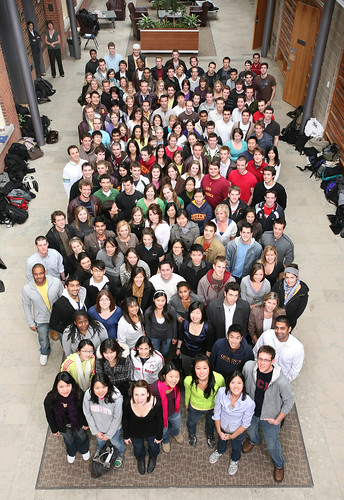Dec 1, 2009 | blog
 I sometimes refer to myself as a closet sociologist, mostly because I find myself looking at some of the outcomes of social media. Sure, I’ve always got “SocMed” on the brain! The past many years, I’ve been observing a few side affects of the evolution of the social web. One of them appears to be the reemergence of family values.
I sometimes refer to myself as a closet sociologist, mostly because I find myself looking at some of the outcomes of social media. Sure, I’ve always got “SocMed” on the brain! The past many years, I’ve been observing a few side affects of the evolution of the social web. One of them appears to be the reemergence of family values.
What kind of took me by surprise, though it shouldn’t have, was that this rediscovery of family and simpler things is mostly from Gen Y. Interestingly, the technologies that fueled web 2.0 and the social web have allowed us to finally start using computers for solving real societal needs – like those of connecting with family, friends and peers. Allowing us to share what we’re doing and how we’re feeling and what we think. Back in the “old days” that required a phone call or a visit. Think about the power of 140 characters in Twitter and how it can replace a 20 min. long distance phone call from one of those stationary wired telephones we used to have.
The ability of the social web to not only answer that question, but many, many others is mind-blowing to say the least. That’s the tip of the iceberg too as we continue to have many brilliant combinations of ideas (mashups!) come to the market to offer solutions we only dreamed of years ago – or maybe saw it on The Jetsons.
What I really find facinating though is the return to the simpler pleasures of family and friends by the latest generation. As they’ve emerged from college and started taking on the daunting role of becoming the largest portion of the workforce in the U.S. today, they’ve been able to show a lot of class in the process. Sure there are the gamer/slackers among them (and Gen X too!), and some fascinating entrepreneurs as well. Every generation has them.
However, its these savvy, digital natives that focus on family, integrity and professionalism that impress me the most. We’ve been told for decades how the Boomers had changed the world, and ushered in a new age of enlightenment. How the generation before them – the Greatest Generation, as it were, tackled so many difficult issues and problems. I suggest that the world that Gen Y is entering adulthood is no less troubled and stressed – in many ways we never thought possible even 20 years ago.
The interesting thing is how this youngest generation, has the potential to change the world in ways the Boomers never could, and doing it from a position of integrity, focusing on family, and being transparent. Its who they are – as natural to them as the iPhone in their hand.
Photo Credit: Maureen Shaughnessy
Jun 9, 2009 | blog
 What is an expert? Is it a guru? Is it someone who has thought deeply on the subject? Or is it someone who has actually performed work and generated results? So many people today are scrambling to become a social media experts, then it’s quite confusing to businesses looking for talented help.
What is an expert? Is it a guru? Is it someone who has thought deeply on the subject? Or is it someone who has actually performed work and generated results? So many people today are scrambling to become a social media experts, then it’s quite confusing to businesses looking for talented help.
The reality in social media, as with any burgeoning industry or trade, there are none. Or at least, there are only a handful who truly have the skills, but will never call themselves experts. I’ve really enjoyed Christopher S. Penn’s explanation of experts in social media. Relating the rise or growth of individuals who have explored the space before many others got there.
In two of his posts from June 2008, Who is a social media expert? and How to Become a Social Media Expert, he recaps the analogy of Japanese martial arts to social media and (ironically 😉 expertly describes why it’s difficult in the world of social media to identify a true expert.
There simply isn’t a better description of what it takes to start down the right path to be a viable social media professional than those two posts. There’s a lot of great content on the Internet to help folks figure it out, and experimentation is a great leaning tool. But as a professional practice, there are many pitfalls to claiming expert status.
As with project management methodologies, there are just too many ways to do the same thing. What works for one client, for one project, for one product, isn’t necessarily what will work for the next. Even if it’s an update to the previously successful product that enjoyed a thrilling viral marketing campaign.
There are talented folks out there though, and these are the one’s that you want to seek out. Whether it be for a contract job, hiring for training purposes, helping change the culture in your company, or running that stunning viral campaign.
They’re not hard to find, but they are hard to get scheduled as they’re often in high demand. So don’t hesitate to ask consultants who inspires them, who they learn from, or what resources they use to learn new things. Their answers are indicative of professionals who know their stuff. For true experts realize that they don’t have all the answers, they are aware that surprises await in every endeavor, and they have the resources to deal with everything that is thrown at them.
So while you should be cautious of those who claim (scream?) expert status from their online profiles, you’ll also find a growing group of real professionals in social media that come from all backgrounds… and that’s for another post.
May 4, 2009 | blog
 Sometimes you don’t know what you have in front of you. The opportunity to change.
Sometimes you don’t know what you have in front of you. The opportunity to change.
That’s what lies before today’s C-Suite executives if they choose to explore it. What I’m talking about here, of course, is really about relationships. With the advent of social computing in the second half of this decade, the power has shifted from producers and marketers to people.
The challenge, of course, is for today’s executives to leap into the deep end of the pool and embrace these new relationships. To build new loyalty into their customer base, by demonstrating the ability to listen, learn, share and improve.
This is a great opportunity that current executives and VPs have that their predecessors didn’t have. The ability to change the relationship and make it one built on the trust and respect of quality products and honest interactivity. This goes equally for internal communications. The opportunity to use these same open and trust building methods within an organization is huge. Especially with organizations that are struggling with employee engagement and moral in these trouble economic times.
It goes beyond displaying good will, however. Any effort in using social computing for building new relationships requires a commitment to open dialog, acceptance of public feedback (both good and bad), and the willingness to discuss this in a public venue.
The point here, is that our current executives have this powerful new option that their ancestors did not. The question is, how many are of strong enough to take that bold step?
Image credit: Envios
Apr 21, 2009 | blog
 It’s an interesting time we live in. Economic turmoil, changing social norms, 100 year old publishing businesses crumbling, and new media powerhouses being established. You’d be hard pressed to give our present era a pass and claim it to be not as important as <fill in your favorite era here>.
It’s an interesting time we live in. Economic turmoil, changing social norms, 100 year old publishing businesses crumbling, and new media powerhouses being established. You’d be hard pressed to give our present era a pass and claim it to be not as important as <fill in your favorite era here>.
Along with these incredible times are some challenges for every business, and everyone that works in them. The reality is that the past decade has brought incredible change in our communications and social structures because of digital communication. Included in this is the first generation raised entirely within the Internet, and mobile communication revolution of advanced technology.
This generation has experienced the freedom of wireless connections from an early age, and rediscovered the power of text communications. The “kids†in this generation have expanded their mental and reflex capacities through vigorous sessions of online, multiplayer, interactive & collaborative games. These folks have no stigma about being online, and this generation comes prewired for online social interaction. They have the ability to actively team-build without preamble and pep talks, can do business virtually without the need to meet in person and can work with folks on the other side of the globe as easily as they work with people in the next cube.
This is the youth movement of today, and they’re entering your business right now. These young folks are part of the largest workforce to enter the American business landscape since the boomers. They are your new entry level employees and they know what’s up. They’re smart, fast to learn new things, and anxious to prove themselves. With the Baby Boomers retiring and GenX/Y moving up, these folks coming out of college are bringing a revolution in relationship management with them.
Are you ready for them?
Photo credit: eddiehosa
Feb 9, 2009 | blog
 We had an interesting discussion around the lunch table the other day regarding many aspects of the current economy. From the mounting job purges of too many large companies and what it all means to us the average person.
We had an interesting discussion around the lunch table the other day regarding many aspects of the current economy. From the mounting job purges of too many large companies and what it all means to us the average person.
Really the discussion came around to how the traditional exercise of searching for a job is changing. There were three of us at lunch today and, not surprisingly, there were three different perspectives and understanding of the process in an environment that we all find ourselves in.
Here is where the differences in age come into play. Among the three of us around the table, there was about a decade from the youngest to oldest. The perception of how best to position oneself in today’s market was probably best understood by the younger two of the group, with the oldest standing fairly firm to the notion that job search and how you go about it hasn’t changed much.
Really, the truth is that it depends on the job you’re looking to get. Calling it a job to begin with is part of the problem, as anyone looking for the next job should really believe that they are looking for the next step in their career. Following the old, tried and true methods of mass mailings, cold-calls, and relying on a headhunter finding you may still work, but one wonders for how long?
Instead, following the example of many an enterprising young millennial may actually be your best bet. Maybe everyone doesn’t feel up to posting videos of themselves on YouTube, or spending hours on Twitter, or the many other social networks. However, at least a full LinkedIn profile, and even a Facebook page, so folks are able to find you, may be in order.
The point I suppose I’m trying to get to is that change has already taken place in the area of job search & career placement; and the sooner you understand that the easier it’ll be to prepare for the next phase of your career. This is as true for seasoned corporate veterans as it is for the new college grad looking to jump into the fray.
It’s time to manage yourself into the next career change rather than falling into it.
Photo credit: ChrisB in SEA
 I sometimes refer to myself as a closet sociologist, mostly because I find myself looking at some of the outcomes of social media. Sure, I’ve always got “SocMed” on the brain! The past many years, I’ve been observing a few side affects of the evolution of the social web. One of them appears to be the reemergence of family values.
I sometimes refer to myself as a closet sociologist, mostly because I find myself looking at some of the outcomes of social media. Sure, I’ve always got “SocMed” on the brain! The past many years, I’ve been observing a few side affects of the evolution of the social web. One of them appears to be the reemergence of family values.

























